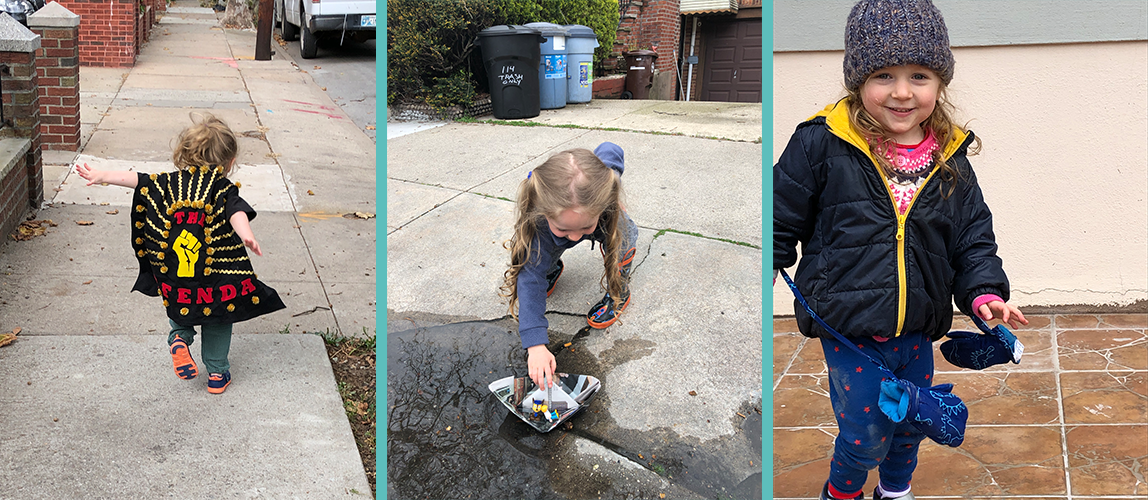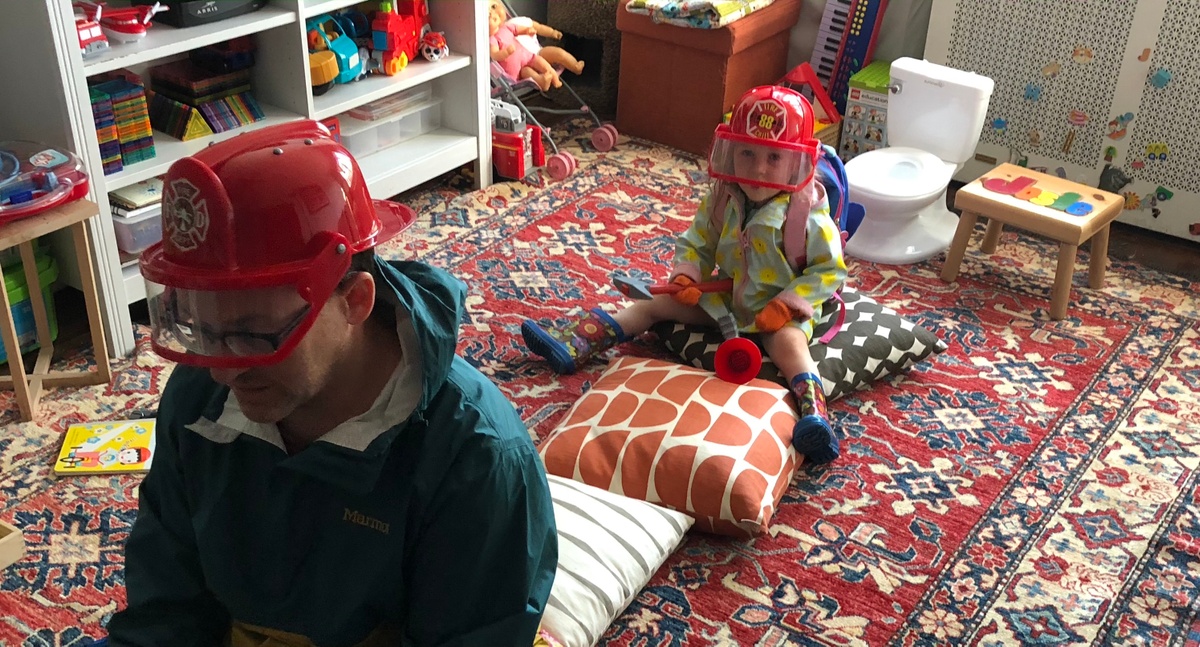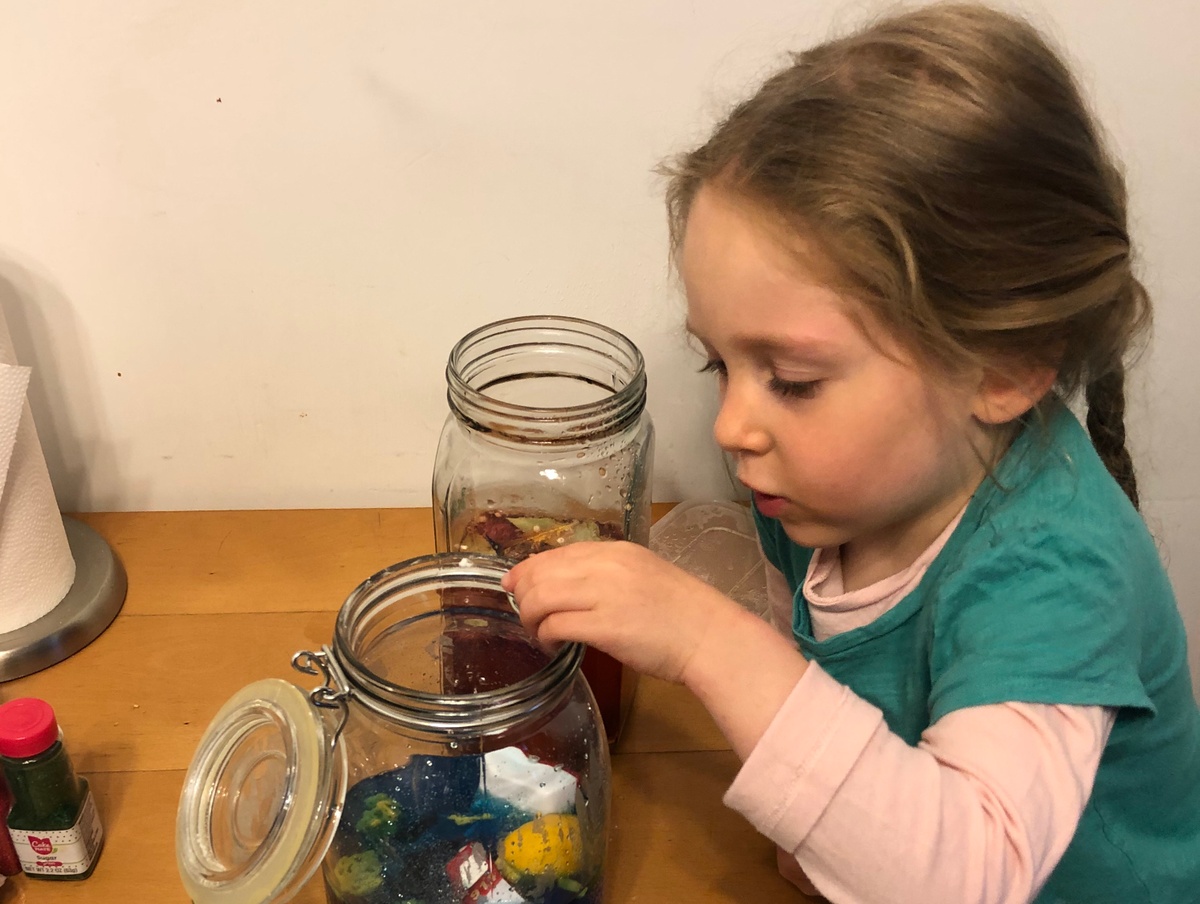Since we began Tinkergarten at Home in mid-March, more and more people are sharing their experiences with the activities. I love scrolling through the OutdoorsAll4 Facebook Group and seeing all of the amazing play happening across the country (and the world!) and the joy and support it’s bringing to kids and their families. At the same time, I also get jealous of the play happening in backyards, front yards, wooded areas, and just—land!—around people’s homes.
I live in Brooklyn, NY with my husband and 4-year-old daughter in a fairly small apartment with no outdoor space. We’re lucky because we live in a building with a stoop that we can sit on, and a short concrete walk that we can use as a play space on most days. By NYC standards, it’s generous. And I really am grateful. We don’t have access to the beautiful and bucolic version of outdoors that people in the suburbs or woods might have, but we do a lot with what we’ve got. My daughter Josie has always loved being outside, and in our current preschooler moodiness stage, it’s become an essential salve. It’s almost like she becomes a different person. Or like it’s the opportunity for a momentary clean slate. And even though the transition of getting a 4-year-old out of the house is an hour of my life I’ll never get back, it’s so worth it. Each week, Tinkergarten at Home features a different skill to incorporate into your kid’s play. We use the suggestions to inspire us to focus on those same skills in our let’s-make-this-work-in-a-small-apartment-in-Brooklyn way. Here’s how.
“Use the Grabber to Pick Up Trash” (aka Transporting)
Several months ago, we were at the lake in Prospect Park watching the ducks when Josie spotted someone in waders, cleaning up garbage with a “grabber.” She was pretty fascinated with what he was doing, asking many questions, sympathizing with the ducks and being curious about and inspired by the man who was cleaning up.
Along with the leaves and rocks and sticks that we can find on our walks, there is usually quite a bit of garbage, too. The other day, something clicked for her and she excitedly told me that she had a GREAT idea! We could use grabbers and a garbage bag to clean up the sidewalk just like the man did in the lake! We didn’t have grabbers exactly, but we did have kid-size hockey sticks. The motor skills involved were very clear: grabbing the trash successfully, keeping it trapped between the sticks until it was above the garbage can, and then dropping it in. Such sustained focus, such pride, and such an organic evolution of ideas. Transporting. Check. (With a little bit of environmental stewardship and community improvement thrown in, too!)
“My Dad the Librarian Gets Free Stuff” (aka Connecting)
My husband is a librarian in the Brooklyn Public Library system. He’s involved in a bunch of outreach there and occasionally brings home library swag for Josie to play with. In the middle of March, Robby brought home some leftover giveaways from an event, with the intent of bringing them back to the library the next workday. Little did we know, here it is 6 weeks later and that “next workday” has yet to happen. Josie discovered the box of stuff he brought home that day and, without calling any attention to herself or asking for help, took a pack of stickers and started to peel them off the roll and stick them onto a humidifier box. And, just like Tinkergarten said, she sat there for a good 45 minutes, carefully peeling and sticking, peeling and sticking, and trying to cover the entire surface of the box in stickers. Connecting. Check.
“Small-Space, Big-Imagination Obstacle Course” (aka Hidden Senses)
We love obstacle courses. We also have limited space. We’ve got climbing, jumping and crawling under things covered, so we added a bunch of active jobs or animals into the mix for twisting, turning and crouching (the vestibular and proprioceptive disco) that would work in our living room. Crawl under the chair then stand on the stool; now stand on one foot like a stork! Now jump to the pillow, then dress up like firefighters and drive your truck to the fire! Hidden senses. Check.
“Bringing the Kitchen into the Bathroom” (aka Water Play)
Playing in the bathtub when it isn’t bath time? Mind. Blown. We heard about making water parks on Tinkergarten at Home LIVE. When we went into the bathroom, looked in the tub, and saw a cookie sheet, some recycled containers, orange peels and ice cube trays, it was like she had won the lottery. She immediately took off her clothes (I said she could keep them on, but she’s an “any chance to be naked” kid) and got in. She stood inside the cookie sheet filled with water for a long time, then she created a pool for Lego figures and floated them on orange-peel rafts. The true highlight though, was the ice. You think waiting for water to boil is a good time? You should try watching an ice cube melt in a bowl. She was captivated, and monitored the temperature throughout with her toe. Water play? Check.
“Toy Boats and Moldy Fruit” (aka Transforming)
The week that Tinkergarten featured “transforming,” I loved seeing all of the potions that people were making on the OutdoorsAll4 Facebook page. They were beautiful and dramatic and kids were clearly engrossed. Many of them had flower petals and pinecones and other beautiful and curious nature treasures floating in colorful liquid. We don’t have easy access to those, but we DO have a fridge with some potential science experiments inside. Overly ripe, slightly moldy fruit? Potion ingredient. Leftover pasta that’s just past the point? Potion ingredient. Little toy boat and car that come apart into pieces? Ingredients. A small cup of dirt from a potted plant? In it went. The natural scientist brain of the preschooler emerged. “The boat floated, mama! I thought it would sink. Let’s try the macaroni next.” I let her use whatever (within reason) she wanted from the kitchen, and that was a huge win. Transforming? Check.
The core concepts for these activities are so universal and so accessible, they really do work anywhere and with anything. Since first trying them with Tinkergarten at Home, the potion-making, garbage-collecting and stickering have all happened multiple times. And the more times Josie returns to these activities, the less I’m involved in the play. (A huge win anytime, but feels monumentally huge right now.) And now that I’m more able to spot these play patterns myself, it’s crazy just how ubiquitous they are and how they persist whether you live in an apartment in Brooklyn, a “back, front, and side yard” house in the suburbs, or—land!—in a clearing in the woods.
P.S. Spotted within the last week:
- Transporting a pile of collected sticks by toy truck to Han Solo to finish building his Millenium Falcon
- Transforming carrots that we didn’t finish for snack into fossils by encasing them in balls of playdough
I’m just saying: Once you know about these patterns of play, you'll see them everywhere.


